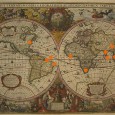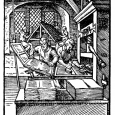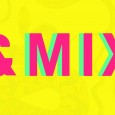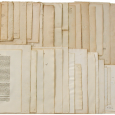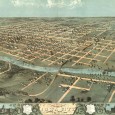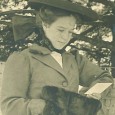-
Recent Posts
Recent Comments
Archives
Categories
Meta
Archives
-
Coffee Zone
Posted on January 13, 2016 | No CommentsCoffee Zone This digital archive encompasses the oral histories of coffee pickers, farmers, hacendados (owners of vast farming land), women and teens from the mountainous western area of Puerto Rico known as the coffee zone. This archive is the first to record and preserve the coffee zone’s dialect and oral histories. The collection also includes the ways in which women in the coffee industry have handled the micro-changes in their community, and how these changes have played a role in the preservation, and sometimes annihilation, of the coffee zone’s dialect. Historically, coffee farming has been closely associated with the social, cultural and economic stability of the western mountainous zone of Puerto Rico. The island’s coffee industry was thriving until the eighties. But due to high production costs, lack of international marketing and dwindling availability of manual labor Puerto Rico’s coffee industry is on the wane. People from the coffee zone are moving to other coastal areas either to work in factories or to study in urban universities to earn professional degrees, leaving behind their community and their traditional way of life. The physical and social mobility happening in the coffee zone is endangering the cultural patrimony of a dialect that was preserved and sheltered by geographical isolation and the coffee industry for centuries. It has been imperative to document this dialect in order to preserve what is left and this digital archive, Del cafetal al futuro/From the Coffee Fields to the Future, exposes the oral stories, culture and phonological characteristics of a Spanish dialect and the people who speak it. This collection serves as a template for other researchers who are documenting similar endangered languages or dialects in other parts of the world. The website could also serve as course material in subjects related to globalization, environmental sciences, agriculture, economy, linguistic, anthropology, gender studies and education. This website shows the linguistic characteristic of vowel raising, this is when mid-final vowels /e/ and /o/ are pronounced as [i] and [u] respectively. It is very common to hear people from San Juan or other coastal areas mocking people from the mountainous western region of Puerto Rico, also known as the coffee zone, about the way they raise vowels. One of the most common comments mocking this feature is: “La genti di Larih toma lechi di poti.” (People from Lares drink canned milk). Based on previous studies and my own observations as a native of Puerto Rico, I started to investigate this linguistic phenomenon in 2004, producing a doctorate dissertation, articles and several presentations. During the time of the mentioned study Puerto Rico had 11,000 coffee farms, but now after a decade there are only 4,000. The physical and social mobility happening in the coffee zone is endangering the cultural patrimony of a centuries old dialect that was preserved by geographical isolation and the coffee industry. This website enhances our understanding on how seemingly unrelated areas, such as migratory patterns and a country’s economy, affect language. The study of threatened languages also has implications for cognitive science since it is the only way we can know how other communities store information and transfer experiences. According to the National Science Foundation, the only way to preserve endangered languages or dialects is by documenting them; once a language is lost a community’s history, culture and traditions disappear forever. Acknowledgments I gratefully acknowledge the Office of Research and Economic Development for supporting this research through an Arts and Humanities Initiative (AHI) Standard Grant. Special thanks to all the coffee haciendas and to the many families and individuals who kindly donated their time for the interviews and share their stories to the world. I would also like to thank my family for their unconditional support during this process. I am particularly thankful to the wonderful team that made this website possible at the Digital Scholarship and Publishing Studio at the University of Iowa Libraries, and I am also thankful for my efficient research assistant Mayela Zambrano. Photographs are a courtesy of Josué Rodríguez from Hacienda La Lealtad Visit the project site Principal investigator(s): Julia Olivier Rajan Project status: Ongoing Project web link: http://coffeezone.lib.uiowa.edu/ -
Dutch in the World
Posted on October 24, 2015 | No CommentsDutch in the World Professor Julie Hochstrasser resituates Dutch art and nurtures new ways of thinking about art and visual culture from the seventeenth century to today. Visit the project site Principal investigator(s): Julie Hochstrasser Project status: Completed Project web link: http://dutch.lib.uiowa.edu/ -
Atlas of Early Printing
Posted on October 24, 2015 | No CommentsAtlas of Early Printing The Atlas of Early Printing is an interactive site designed to be used as a tool for teaching the early history of printing in Europe during the second half of the fifteenth century. While printing in Asia pre-dates European activity by several hundred years, the rapid expansion of the trade following the discovery of printing in Mainz, Germany around the middle of the fifteenth century is a topic of great importance to the history of European civilization. Visit the project site Principal investigator(s): Greg Prickman Project status: Completed Project web link: http://atlas.lib.uiowa.edu/ -
&Mix
Posted on October 23, 2015 | No Comments&Mix &MIX is an initiative of the University of Iowa Libraries to encourage the creative reuse of public domain materials in the Iowa Digital Library by students and the general public. Visit the project site Principal investigator(s): Anne Sand Project status: Completed Project web link: https://dsps.lib.uiowa.edu/andmix/ -
Paper Through Time
Posted on October 22, 2015 | No CommentsPaper Through Time Professor and MacArthur Fellow, Tim Barrett explores the history, composition, craft, and conservation of paper through time. Visit the project site Principal investigator(s): Timothy Barret Project status: Completed Project web link: http://paper.lib.uiowa.edu/ -
Mapping Stories in Iowa City
Posted on August 26, 2015 | No CommentsMapping Stories in Iowa City Mapping Stories in Iowa City is cool. Project status: In development -
DIY History
Posted on August 26, 2015 | No CommentsDIY History DIY History lets you do it yourself to help make historic artifacts easier to use. Our digital library holds hundreds of thousands of items — much more than library staff could ever catalog alone, so we’re appealing to the public to help out by attaching text in the form of transcriptions, tags, and comments. Through “crowdsourcing,” or engaging volunteers to contribute effort toward large-scale goals, these mass quantities of digitized artifacts become searchable, allowing researchers to quickly seek out specific information, and general users to browse and enjoy the materials more easily. Please join us in preserving our past by keeping the historic record accessible — one page or picture at a time. Visit the project site Principal investigator(s): Matthew Butler Project status: Ongoing Project web link: http://diyhistory.lib.uiowa.edu/ -
Explorer’s Legacy
Posted on August 26, 2015 | No CommentsExplorer's Legacy January 31, 1958: the world was watching as the United States launched its first satellite into earth orbit. Explorer I was a response to the launch of Sputnik I and II by the Soviet Union, but it differed from those historic flights in one substantial way—it carried a scientific experiment into space for the first time, which sent data back to earth. Although primitive by modern standards, the cosmic ray detector onboard Explorer I discovered the radiation belts surrounding the earth that bear Van Allen’s name today, and mark the beginning of data received from space, which today represents enormous amounts of information from thousands of sources. The origin point is here in Iowa, a moment of international historic importance that anchors the state as one of the most significant cradles of the space program. Visit the project site Principal investigator(s): Greg Prickman Project status: Completed Project web link: http://explorer.lib.uiowa.edu/ -
Fluxus Digital Collection
Posted on August 26, 2015 | No CommentsTaking shape around 1959, the international cohort of artists known as Fluxus experimented with —or better yet between—poetry, theater, music, and the visual arts. More than a list of artists, a historical moment, or a set of artifacts, Fluxus gives name to a network of social relationships and common approaches to art-making that highlights, among other things, playfulness, simplicity, internationalism, intermedia, ephemerality, and the unity of art and everyday life. The American artist Ken Friedman calls Fluxus a “laboratory,” emphasizing both its experimentation and collaborative spirit. For his Lithuanian-born countryman George Maciunas, Fluxus is “a way of doing things” that foregrounds process over product. The Japanese artist Mieko Shiomi proposes that Fluxus is a set of lived concepts, a “pragmatic consciousness,” in which “we see things differently in everyday life after performing or seeing Fluxus works.” Fluxus Digital Collection The Fluxus Digital Collection is an online archive that gathers an eclectic range of artworks by one of the most important movements of the twentieth century. The group’s members are famous for their creation of ephemeral and genre-blurring “intermedia” artworks, their performance events, and the international networks they forged to facilitate creative collaboration. The University of Iowa Libraries houses an impressive collection of Fluxus art and ephemera, including works by internationally acclaimed artists Ken Friedman, John Cage, Dick Higgins, George Maciunas, Yoko Ono, Mieko Shiomi, Nam June Paik, George Brecht, Robert Filliou, Ay-O, Dieter Roth, Joseph Beuys, Milan Knizak, Shigeko Kubota, among others. Visit the project site Principal investigator(s): Stephen Voyce Project status: Ongoing Project web link: http://fluxus.lib.uiowa.edu/

![Coffee Zone Coffee Zone This digital archive encompasses the oral histories of coffee pickers, farmers, hacendados (owners of vast farming land), women and teens from the mountainous western area of Puerto Rico known as the coffee zone. This archive is the first to record and preserve the coffee zone’s dialect and oral histories. The collection also includes the ways in which women in the coffee industry have handled the micro-changes in their community, and how these changes have played a role in the preservation, and sometimes annihilation, of the coffee zone’s dialect. Historically, coffee farming has been closely associated with the social, cultural and economic stability of the western mountainous zone of Puerto Rico. The island’s coffee industry was thriving until the eighties. But due to high production costs, lack of international marketing and dwindling availability of manual labor Puerto Rico’s coffee industry is on the wane. People from the coffee zone are moving to other coastal areas either to work in factories or to study in urban universities to earn professional degrees, leaving behind their community and their traditional way of life. The physical and social mobility happening in the coffee zone is endangering the cultural patrimony of a dialect that was preserved and sheltered by geographical isolation and the coffee industry for centuries. It has been imperative to document this dialect in order to preserve what is left and this digital archive, Del cafetal al futuro/From the Coffee Fields to the Future, exposes the oral stories, culture and phonological characteristics of a Spanish dialect and the people who speak it. This collection serves as a template for other researchers who are documenting similar endangered languages or dialects in other parts of the world. The website could also serve as course material in subjects related to globalization, environmental sciences, agriculture, economy, linguistic, anthropology, gender studies and education. This website shows the linguistic characteristic of vowel raising, this is when mid-final vowels /e/ and /o/ are pronounced as [i] and [u] respectively. It is very common to hear people from San Juan or other coastal areas mocking people from the mountainous western region of Puerto Rico, also known as the coffee zone, about the way they raise vowels. One of the most common comments mocking this feature is: “La genti di Larih toma lechi di poti.” (People from Lares drink canned milk). Based on previous studies and my own observations as a native of Puerto Rico, I started to investigate this linguistic phenomenon in 2004, producing a doctorate dissertation, articles and several presentations. During the time of the mentioned study Puerto Rico had 11,000 coffee farms, but now after a decade there are only 4,000. The physical and social mobility happening in the coffee zone is endangering the cultural patrimony of a centuries old dialect that was preserved by geographical isolation and the coffee industry. This website enhances our understanding on how seemingly unrelated areas, such as migratory patterns and a country’s economy, affect language. The study of threatened languages also has implications for cognitive science since it is the only way we can know how other communities store information and transfer experiences. According to the National Science Foundation, the only way to preserve endangered languages or dialects is by documenting them; once a language is lost a community’s history, culture and traditions disappear forever. Acknowledgments I gratefully acknowledge the Office of Research and Economic Development for supporting this research through an Arts and Humanities Initiative (AHI) Standard Grant. Special thanks to all the coffee haciendas and to the many families and individuals who kindly donated their time for the interviews and share their stories to the world. I would also like to thank my family for their unconditional support during this process. I am particularly thankful to the wonderful team that made this website possible at the Digital Scholarship and Publishing Studio at the University of Iowa Libraries, and I am also thankful for my efficient research assistant Mayela Zambrano. Photographs are a courtesy of Josué Rodríguez from Hacienda La Lealtad Visit the project site Principal investigator(s): Julia Olivier Rajan Project status: Ongoing Project web link: http://coffeezone.lib.uiowa.edu/](https://www.lib.uiowa.edu/studio/files/2016/01/czones-115x115.jpg)
